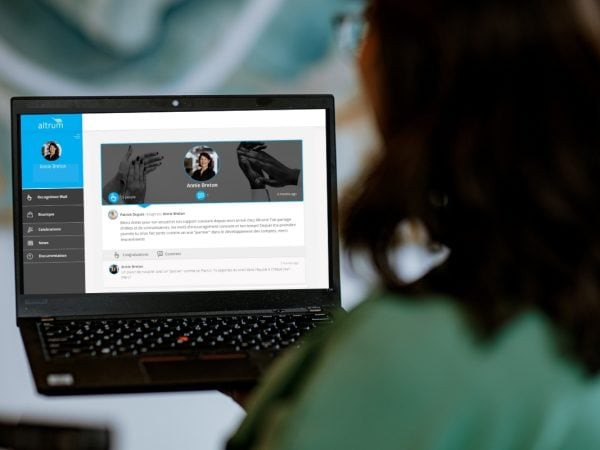Peer Recognition: How Can HR Encourage It?
January 14, 2025, In Employee Engagement
Peer recognition brings many benefits to the workplace. Research shows that it motivates employees to help one another, creating a nurturing environment. And when people anticipate positive feedback, they in turn show altruistic behaviour.
These two examples alone show that recognition at work helps foster a positive and cooperative environment. When peer recognition is lacking, employees can feel disengaged and demotivated, leading to poor retention rates and frequent turnover.
Fortunately, HR professionals have tools available to influence employee recognition within their teams. In this article, we’ll explore how HR can encourage peer recognition at work and learn more about the benefits of peer-to-peer recognition and how it helps build a better workplace.
What Are the Tangible Forms of Peer Recognition in the Workplace?

Peer recognition is the practice of employees acknowledging one another’s contributions to the workplace and the value it brings.
This can be achieved in various ways:
- Positive comments made during an informal conversation
- Verbal recognition shared during a team meeting
- Comments in an email from one peer to another
- Feedback given during a performance review
- An endorsement on LinkedIn or another social media platform
- A thank-you card acknowledging an employee’s positive impact
- A recognition message shared on internal platforms such as Teams, Slack, or an appreciation wall
Clearly, there are many ways for managers and workers to express their appreciation for their colleagues, and each one can have a massive impact. Let’s take one of Altrum’s clients, for example. The call centre of one of the world’s biggest IT and business consulting companies has seen significant results with Altrum’s peer recognition software and points-based rewards system.
The company was concerned that by working remotely, call centre staff would start to be disengaged and less productive when they were in the office. They understood the value of fostering unity and motivating employees through recognition. As a result, they sought innovative ways to promote these values, even while working remotely.
They called on Altrum to customize a peer recognition platform with incentive campaigns and personalized dashboards. These were designed to encourage peer-to-peer recognition and reward employees.
Its Appreciation Wall feature gave workers a platform where they could highlight their peers’ achievements and contributions. It doubled up as a place where managers could award points for great work by their team members.
Since the platform has been in place, it has:
- Boosted peer recognition
- Inspired employee motivation and engagement
- Helped workers improve their performance
The Benefits of Peer Recognition

Peer recognition offers benefits that strengthen corporate culture, inspire loyalty, reduce turnover and ease employee engagement. Let’s explore further what peer recognition can achieve.
Strengthen the Corporate Culture
By itself, recognition fosters transparency, trust and collaboration. Each act of appreciation generates further positivity in a virtuous circle, inspiring and motivating employees to achieve more.
When employees receive positive feedback from their peers, they feel supported taking risks and practise innovative behaviour. Together, teams work towards common goals for personal and corporate growth.
Companies that introduce recognition programs experience measurable results. German energy company E.ON employed a simple system of thank-you notes. They found that:
- Their staff motivation score increased from 61% to 69%.
- The proportion of employees who felt valued rose by 39% to 52%.
- Employees gained a greater understanding of the business’s vision, with this score increasing from 57% to 75%.
Promote Employee Loyalty and Reduce Turnover
Peer recognition plays a crucial role in employee retention, especially in sectors where there is strong competition for talent. In fact, research has found that workers who receive recognition are 45% less likely to switch employers two years afterwards.
Technology company Cisco uses their own employee recognition program called Connected Cisco. It includes gifts and giveaways, marking anniversaries and other celebrations to incentivize staff. The program allows workers to take small rewards or save them up for once-in-a-lifetime experiences, such as a trip to Disneyland.
Investing in its people in this way has earned Cisco accolades such as:
- No 1 in the 2024 PEOPLE® Companies that Care Ranking
- No 2 in the 2024 Fortune 100 Best Companies to Work for Ranking
- No 2 in the 2024 Fortune Best Workplaces for Women Ranking
The natural consequence is that with so many happy employees, retention rates remain high. Cisco says that 65% of employees have been with the company for five years or more
Facilitate Employee Engagement
Peer recognition also plays an essential role in facilitating employee engagement. Again, this is a great advantage in an environment marked by strong competition for talent.
Google successfully uses a range of measures to engage staff and promote a positive culture. One of these is their peer-to-peer recognition program, gThanks. One of its features allows workers to send colleagues personal thank-you notes, which are shared on a public platform.
The results are measurable. In a survey, 61% of employees said that they felt acknowledged for their efforts. 85% reported that their workplace was positive, while 80% said they were excited about going to work every day.
You too can make peer recognition the cornerstone of your business. Discover Altrum’s customizable recognition program for rewarding employees, encouraging peer recognition and strengthening your corporate culture.
How Can HR Encourage Recognition at Work?

Strategies for encouraging recognition at work don’t have to be complicated. With clear criteria and the right tools, you can seamlessly instill the practice of daily recognition.
Establish Clear and Transparent Recognition Criteria
Start by defining clear criteria for employee recognition. This makes your system transparent and easy to follow for your team. Recognition can be tailored to highlight specific qualities, such as team spirit, initiative, innovation, performance, creativity, going the extra mile and positive attitude.
Consider aligning these categories with your corporate values to make them even more impactful. This ensures that the recognition feels authentic and relevant to your business.
Going back to the example of Google, they’ve defined a set of corporate values called “10 things we know to be true.” One of these is “Great just isn’t good enough,” which could easily be aligned with the criteria “Going the extra mile.”
At Altrum, we’ve embraced this practice as well. Through our appreciation wall, employees can recognize one another while tying their messages to one of our four core values, making each acknowledgment even more meaningful and aligned with the company culture.
Linking up criteria and values in this way makes your recognition system fair, relevant and transparent for your employees.
Provide the Right Tools to Practise Recognition at Work
The next step is to choose the right tools to address your company’s needs to manage recognition. They should match your requirements while making the recognition process simple and automated.
Altrum’s peer recognition software and points-based rewards system is a flexible and user-friendly platform that can be adjusted to your needs. One of its principal features is to celebrate positive behaviours by allowing employees to recognize each other on an appreciation wall. One standout feature of the software is its real-time recognition feed, which celebrates milestones and accomplishments as they happen. For example, the integrated badge system automatically acknowledges employees who embody your corporate values, fostering a culture of appreciation and alignment.
It also includes automatic celebrations for work anniversaries and birthdays, ensuring every milestone gets recognized.
The platform simplifies tracking key company KPIs, enabling you to effectively measure the success and impact of your initiatives—whether they are related to recognition, performance, or overall business objectives.
Additionally, the customizable reward boutique allows you to tailor rewards to your team’s preferences—whether it’s branded swag, company perks, gift cards, or virtually any reward you can imagine!
Offering these and many other useful features in a single platform makes recognition easy for managers and employees alike.
Facilitate recognition and boost engagement with a comprehensive, customizable platform.
Ensure the Practice of Authentic, Daily Recognition
Once you have your tool in place, you can create incentive campaigns to encourage peer-to-peer recognition to ensure that employees stay engaged and committed.
Another effective approach is to encourage managers to incorporate recognition into their daily routines by providing training on best practices and approaches. For example, the Culture, Sports, Leisure, and Social Development of the Rosemont-Petite-Patrie Borough of Montreal has taken Altrum’s recognition training to help its managers understand how to integrate recognition practices into their daily work, as well as the variety of different ways to practise and encourage recognition.
Since completing the training, managers have been regularly using various methods to recognize their team’s efforts and keep employees motivated and engaged. These initiatives include team lunches, gift cards, and celebratory moments.
Discover Altrum’s training to integrate recognition into your daily practices and strengthen employee commitment.
Safeguard the Future with Peer-to-Peer Recognition

Peer recognition plays a prominent role in strengthening corporate culture, engaging employees and boosting retention rates. HRs can safeguard the future of their business by implementing a peer-to-peer recognition program to maintain a positive work environment.
Peer recognition has a long-term impact that resonates with employees. As we’ve seen in our examples, leading companies like one of the biggest IT and consulting firms E.ON, Cisco and Google have embraced recognition systems with tangible results.
Implement peer-to-peer recognition in your company to bring your employees together. Find out more about Altrum’s solutions today, the flexible solution for your recognition program needs.










